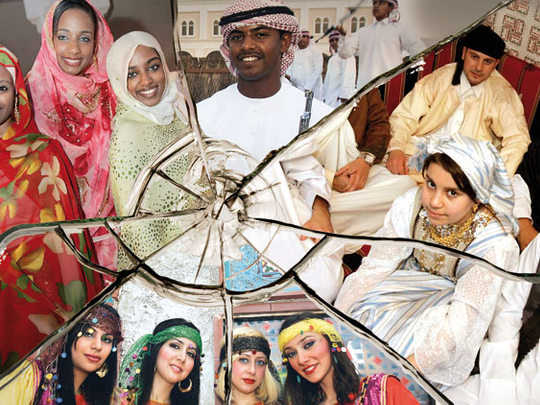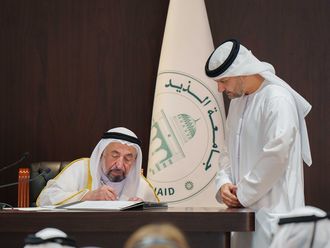
As the UAE is home to about 160 nationalities it is natural to expect its campuses to be as diverse as possible. From Syrians to Sri Lankans to Lebanese and Nigerians, there are more than 70 nationalities studying together in most universities here. The ethnic identity of these students on campus is represented by various cultural clubs. These clubs showcase the heritage of these ethnic groups by celebrating national days by performing traditional dances and organising local food festivals throughout the year. But the real question is are these clubs making the campus truly multicultural or are they isolating students in their own ethnic groups?
Comfort zone
The reality according to experts is that students on campus show a tendency to mingle with those from a similar ethnic background and this behaviour then gets extended to the cultural clubs. In that way the clubs actually encourage student cliques from a particular ethnic background. "Though there are students from several nationalities on campus I usually see them socialising with those sharing a similar culture. Even in the clubs you might see an Arab student joining a Lebanese club or a Syrian club but never a South Asian club and vice versa," says a psychologist and student counsellor of a leading university in UAE.
Preeti Mogali, a final year architecture student of American University of Sharjah (AUS), agrees that there is a tendency among students to stick to clubs of their own nationality as they share many common factors and feel that they are part of a group. Barring one instance of joining the Pakistani club Preeti, an Indian by origin, actively participated in the Indian club throughout the five years at AUS. Her university has 34 such ethnic clubs.
Defence mechanism
From the psychological point of view a student's tendency to be attracted to clubs of their own culture can be attributed as a defence mechanism to counter fears associated with an unfamiliar environment. Psychologists say the ethnic clubs give a much needed comfort factor to students for whom multiculturalism can be intimidating at first.
According to Dr Annie Crookes, professor of psychology at Middlesex University Dubai, when people are in an unfamiliar and new situation they try to find comfort in what is familiar and in the case of students it means that they are likely to be drawn to those from similar backgrounds to gain some comfort and confidence in a new situation. "Unfortunately this can mean that groups do seem to get formed more at the beginning of the course and may stop students from socialising beyond their culture. It is one of the key aspects of personal development gained from universities and the social clubs and activities are a big part of this, as are group coursework and assignments," adds Dr Crookes.
Being far away from their country, family and cultural environment international students join cultural clubs to alleviate feelings of isolation. These clubs then help create an almost home away from home through culturally representative enclaves. "Although the clubs offer support and cultural familiarity in some instances they may also create a case where the student interacts exclusively with people from their own cultural background. However, if that's the case, that student is likely to engage in this exclusivity with or without the presence of the club," says Samineh Shaheem, assistant professor of psychology, Human Relations Institute, Dubai. That suggests that the personality of the student could also be one of the factors in his or her choice of being cocooned in an ethnic group.
However, the good news is that in all the universities students of any origin are free to join clubs of any nationality or culture. In fact, some universities such as American College of Dubai and Midldlesex University, Dubai have consciously designed clubs that are not on the basis of ethnicity or culture.
"Our clubs are based on causes," points out Dragana Symons, student activities co-ordinator, Middlesex University Dubai. Middlesex's clubs are called awareness clubs, student council club, sports club and drama club.
Understanding heritage
On the part of the students joining an ethnic club also means that they get to understand their culture, history and heritage better. It is also a great channel to educate other students about their society and country. As part of the Palestinian Arab cultural club of the American University of Dubai one can learn Palestinian dabkeh dancing, get music band training, read Palestinian books and watch DVDs.
Students also get to understand the diversity of other cultures on Global Days or during multicultural events where each ethnic club hosts stalls with indigenous products.
Usha Goplani, president of the Desi club at the University of Wollongong in Dubai, tells us how she decorated her stall with traditional Indian wares to showcase her country's rich cultural heritage. "I decorated the stall with Indian jewellery, clothes, doli [used in marriages] sweets, spices and the tulsi [basil] plant," says Goplani.
Socialising
Besides learning about one's own culture the clubs provide an opportunity for students to socialise and enjoy the lighter moments on campus. Each club organises and participates in various events throughout the year. There are picnics and barbecues in beaches and parks, singing and dancing performances, sports meets and theatre acts. "If it were not for the clubs students would just attend classes and go back home," adds Preeti.
Organising and participating in student clubs also teaches these youngsters many essential life skills. By interacting with students, professors and dignitaries they acquire communication skills.
Arranging events helps them to learn organisational skills. "During promotions for clubs I learnt marketing techniques," says Abdul Rahman Habbal, president of the Syrian club at AUS.
The clubs not only help students express their diversity but also foster skills that will aid them in their careers. Cultural or non-cultural, clubs are great channels for one's overall development students say.












